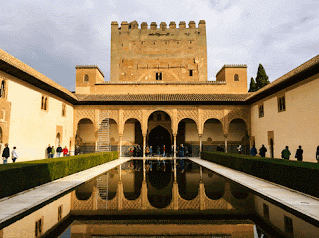The Rijksmuseum (English: State Museum) is a Dutch national museum dedicated to arts and history in Amsterdam in the Netherlands. The museum is located at the Museum Square in the borough Amsterdam South, close to the Van Gogh Museum, the Stedelijk Museum Amsterdam, and the Concertgebouw.
The Rijksmuseum was founded in The Hague in 1800 and moved to Amsterdam in 1808, where it was first located in the Royal Palace and later in the Trippenhuis. The current main building was designed by Pierre Cuypers and was originally opened in 1885, but was closed for renovation from 2003 to 2013. On 13 April 2013, the main building was reopened by Queen Beatrix after the ten year renovation which cost € 375 million.
The museum has on display 8,000 objects of art and history, from their total collection of 1 million objects from the years 1200–2000, among which are some masterpieces by Rembrandt, Frans Hals, and Johannes Vermeer. The museum also has a small Asian collection which is on display in the Asian Pavilion.

































.gif)











